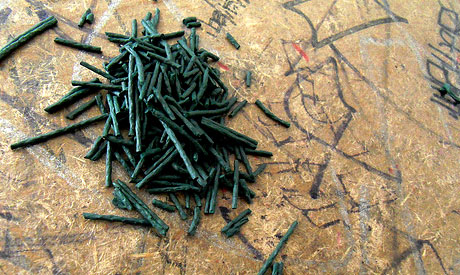
Recently, my 10 year old daughter asked me: “if you could only eat one food for the rest of your life, what would it be?” I think she expected me to say “chocolate” – instead, I answered “spirulina.” A terrible grimace came over her face as she thought about the dark-green, foul smelling powder I make into a drink every morning. “Why?” she said with disgust. I answered quite simply: “I assumed you meant what one food would keep me healthy. Spirulina has basically everything I need to keep me alive and healthy for a long time, and that is my goal.” After having that conversation, I realized I should start spreading the word about spirulina and its amazing benefits.
It’s Good Enough for High-Impact Life on Space
In the 1980s NASA started doing research on foods that could be used to sustain life in space. They decided to study different plants and see which ones were the best. Spirulina, a class of algae which is actually 3.5 billion years old, is one they decided to look at very carefully. The study concluded by saying that spirulina was in fact a good choice for use in long term space flight. It is known for being the richest source of vitamin B12, as well as a good source of vitamins B1 and B2. With one gram of spirulina, you can satisfy half of the adult daily requirements of vitamin A (B-carotene). It’s also rich in protein and iodine, which is ideal for high-impact life in space.
So it’s good for outer space, but what about here on earth? What benefits can be derived while living on this planet? Here are a few other studies and details that point to its potential value in very different aspects of health.
It Inhibits Growth of Breast Cancer Cells
According to a study1 published in the U.S. National Library of Medicine, it showed spirulina extract could inhibit the growth of harmful breast cancer cells, which indicate that it could be beneficial in prevention of breast cancer.
It Improves Academic Performance
Another research article2 published in the U.S. National Library of Medicine indicates an improvement is academic results in a random group of 100 students over a two month period of supplementing with spirulina. The students who took a daily dose of 2 grams of spirulina (mixed with honey) showed improvement in their academic performance.
It has Protective Benefits
Rosiglitazone is an anti-diabetic drug that has been associated with increasing the risk of osteoporosis3. But a study4 published in the U.S. National Library of Medicine reports that supplementing with spirulina reduced the risks. The high calcium and phosphorus content can help strengthen the bone surface.
Click Here, to research spirulina further. Once you have completed your research, you will probably agree that supplementing with Spirulina would be an excellent addition to your diet.
PLEASE NOTE: Spirulina has tremendous cleansing and detoxifying properties; so it is recommended that you work with a natural health practitioner if you have been or are currently taking medication or have any health concerns. When starting your supplementation, it is recommended that you start with the lowest possible dosage, monitor any possible detoxification side effects (e.g. headache, rash) and increase your dosage slowly.
References:
1] http://www.ncbi.nlm.nih.gov/pubmed/19926246?itool=EntrezSystem2.PEntrez.Pubmed.
2] http://www.ncbi.nlm.nih.gov/pubmed/19863020?itool=EntrezSystem2.PEntrez.Pubmed.
3] http://www.medscape.com/viewarticle/552498
4] http://www.ncbi.nlm.nih.gov/pubmed/19896232?itool=EntrezSystem2.PEntrez.Pubmed.
Photo Credit: William Ismail




